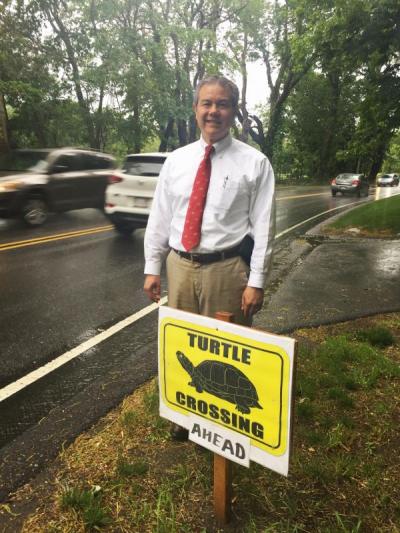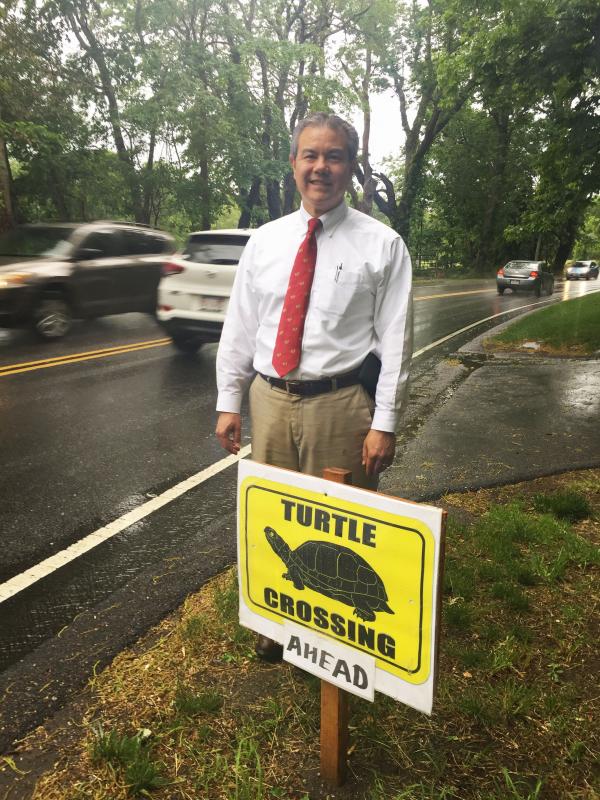Meet the man behind the Tucker Road 'turtle crossing' signs
For the past 20 years, Paul Bacdayan has driven up Tucker Road toward the University of Massachusetts Dartmouth, where he teaches business, and back to his South Dartmouth home. Along his route, he's noticed something disturbing.
There's a small stretch of Tucker Road where box turtles are consistently run over, he said, so Bacdayan has created signs along the route to bring awareness to his fellow commuters.
"It just needed to be done," said Bacdayan. "One year, there was two in the same spot. Their shells break open, and they're all mangled."
Bacdayan purchased a "turtle crossing" image online, and enlarged it, he said. Drivers now see the crossing signs, and "turtle crossing ahead" warnings.
"They're really a nifty animal. That's the most endearing thing about them, is that they live so old," Bacdayan said.
In fact, females live up to 100 years, according to the Lloyd Center's Research Director Mark Mello. Losing one is a hit to the population, he explained.
"They're listed as 'special concern' because their numbers have declined significantly," said Mello. "A lot of the mortality is from crossing roads and getting hit by vehicles.”
Mello said that younger turtles are more subject to predation — they're a tasty snack for blue herrings, but that's not the prime killer as the turtles mature.
Between late May and early June is breeding season for the native Eastern Box Turtles. Males search for females, and females search for a place to lay eggs, which expands their range significantly, said Mello.
The terrestrial animals like to be near water, which makes Southeastern Massachusetts' wooded wetlands — including around the Noquochoke Wildlife Management Area and Lloyd Center — a popular habitat, said Mello. However, unlike amphibians, turtles don't have to be wet, he said.
The omnivores enjoy a varied diet, which includes worms, berries, and lettuce, said Mello. And, like humans, they don't manufacture Vitamin D, but must absorb it from the sun, he added.
"They come down in the flats where it's sandy and west-facing to lay their eggs," observed Bacdayan.
Along with his signs, Bacdayan specifically addressed Tucker Road residents. Letters he put in their mailboxes read, "I've placed a sign saying 'Turtle Crossing' in what may be your frontage on Tucker Road.... Please join me in this experiment by leaving the signs in place. Or call me if you'd prefer the sign moved."
But Bacdayan said the reaction has been nothing but positive. "Nobody complained. One of the property owners called and said, 'We're thrilled. We have a turtle resting in our yard.'"
"It just tears me up to see them dead," Bacdayan concluded. He said that drivers can avoid hitting turtles by "slowing down a little and being on the lookout.” This will not create a major traffic hazard, he said.
He added that due to Tucker Road's narrow shoulders and limited visibility, people should not put themselves or other motorists in danger if they decide to stop and help a turtle get safely cross the road.
Bacdayan said the action was partly setting a good example for South Dartmouth Troop #170, where he is an assistant scoutmaster. Conservation is a priority, and the troop regularly does trash cleanups, he said.
Bacdayan plans to keep the signs up through the Fourth of July weekend, but will take them down on July 5, he said. Additionally, visitors are welcome to visit the box turtles breeds currently housed at the Lloyd Center, located at 430 Potomska Road.














